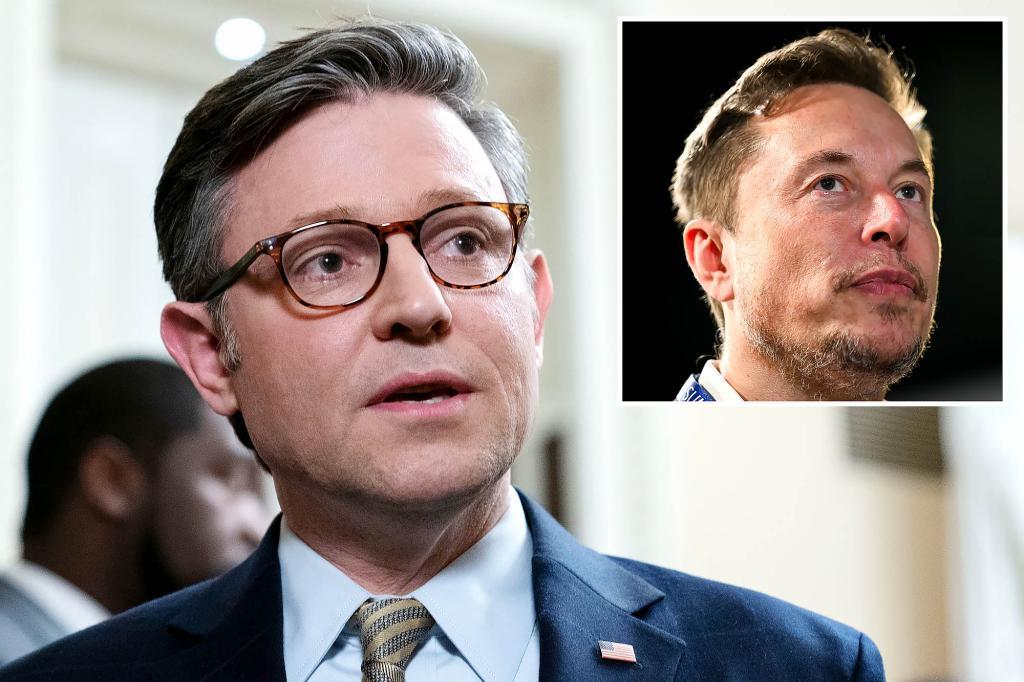The dramatic showdown over government funding took a surprising turn when House Speaker Mike Johnson revealed a humorous exchange with Elon Musk, the incoming chief of President-elect Donald Trump’s Department of Government Efficiency. Following Musk’s instrumental role in derailing an initial, voluminous spending bill, Johnson jokingly offered the billionaire the speakership. This lighthearted gesture, made amidst the intense pressure of averting a government shutdown, underscores the extraordinary challenges of the position, a sentiment echoed by Musk himself. The episode highlights the unconventional influence Musk wields in the political sphere, further amplified by his impending official role in the Trump administration.
The initial spending bill, a hefty 1,547-page document, was met with strong opposition, particularly from Musk and President-elect Trump. Their combined criticism, coupled with Johnson’s efforts, led to a significantly slimmed-down 118-page version. This drastic reduction, achieved through two days of intense negotiations and compromises, prompted some House Democrats to sardonically refer to Musk as “President Musk,” a testament to his perceived power and influence in shaping the final outcome. Musk’s public praise of Johnson’s handling of the situation further emphasized his involvement, positioning himself as a key player in the high-stakes political drama.
While the conversation between Johnson and Musk about the speakership was presented as a joke, it inadvertently raised a constitutional point. Technically, the role of House speaker does not mandate membership in the House of Representatives. Although all previous speakers have been House members, the possibility of Musk, a non-member, assuming the position is theoretically permissible, adding another layer of intrigue to the already complex situation. However, Johnson’s own tenure as speaker faces uncertainty due to the Republicans’ slim majority and internal divisions over the spending bill, regardless of its reduced size. The incident sparked discussions about the evolving dynamics of power and influence in Washington, particularly with the advent of figures like Musk taking center stage.
The revised spending bill, despite its significantly reduced size, still required passage in the Senate and President Biden’s signature to avert a partial government shutdown. Johnson emphasized his consistent communication with President-elect Trump throughout the process, highlighting the incoming administration’s support for the final version. This close collaboration underscored the alignment between the House leadership and the incoming president on fiscal matters, setting the stage for a potential shift in spending priorities once the new administration and Congress are fully in place. The episode demonstrated the delicate balancing act Johnson faced, navigating internal party pressures while coordinating with the incoming administration.
Johnson’s argument for the scaled-back spending bill centered on the idea of a temporary compromise. He stressed that the Republicans, upon gaining full control of both chambers of Congress and the White House in January, would be better positioned to implement their fiscal agenda. This approach framed the current bill as a necessary bridge to avoid immediate crisis, allowing for more substantial changes to federal spending in the near future. This strategic framing aimed to appease fiscal hawks within the Republican party while ensuring the government’s continued operation, reflecting the complex political landscape Johnson navigated.
The episode surrounding the government spending bill, punctuated by the unexpected interaction between Johnson and Musk, reveals the complex dynamics at play in Washington. It underscores the challenges of governing with slim majorities, the influence of powerful non-political figures, and the strategic maneuvering required to avert crises while setting the stage for future policy changes. The incident serves as a microcosm of the broader shifts occurring in the political landscape, highlighting the evolving roles of traditional political actors and the emergence of unconventional influences shaping the nation’s future.

